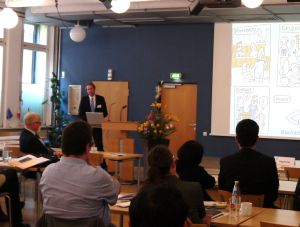
The UNESCO-UNEVOC International Centre: Who We Are | What We Do | Working With Us | Get in Touch
The UNEVOC Network: Learn About the Network | UNEVOC Network Directory
For Members: UNEVOC Centre Dashboard
Thematic Areas: Inclusion and Youth | Digital Transformation | Private Sector Engagement | SDGs and Greening TVET
Our Key Programmes & Projects: BILT: Bridging Innovation and Learning in TVET | Building TVET resilience | TVET Leadership Programme | WYSD: World Youth Skills Day
Past Activities: COVID-19 response | i-hubs project | TVET Global Forums | Virtual Conferences | YEM Knowledge Portal
Our Services & Resources: Publications | TVET Forum | TVET Country Profiles | TVETipedia Glossary | Innovative and Promising Practices | Toolkits for TVET Providers | Entrepreneurial Learning Guide
Events: Major TVET Events | UNEVOC Network News

The dual system programme model is rooted in Germany and is considered as having contributed to expanding employment opportunities for German youth.
The seminar was attended by representatives from 20 countries, including delegates from Federal Ministry of Education and Research (BMBF), the German Council of Science and Humanities, the Friedrich-Alexander-University Erlangen- Nuremberg- FAU, SIEMENS Nuremberg and Hanseatic Parliament. The seminar was organized in collaboration with the BIBB.